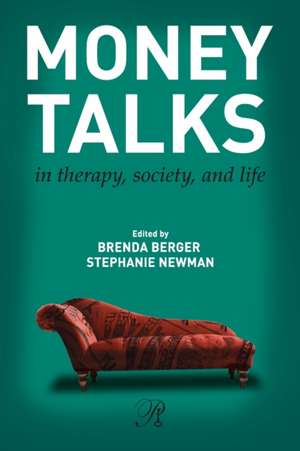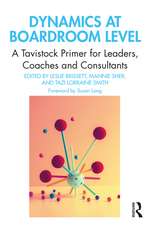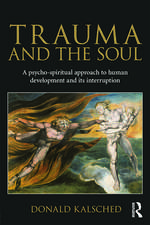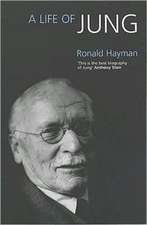Money Talks: in Therapy, Society, and Life: Psychoanalysis in a New Key Book Series
Editat de Brenda Berger, Stephanie Newmanen Limba Engleză Paperback – 28 iul 2011
| Toate formatele și edițiile | Preț | Express |
|---|---|---|
| Paperback (1) | 399.79 lei 6-8 săpt. | |
| Taylor & Francis – 28 iul 2011 | 399.79 lei 6-8 săpt. | |
| Hardback (1) | 1100.06 lei 6-8 săpt. | |
| Taylor & Francis – 4 aug 2011 | 1100.06 lei 6-8 săpt. |
Din seria Psychoanalysis in a New Key Book Series
- 5%
 Preț: 191.35 lei
Preț: 191.35 lei - 5%
 Preț: 219.54 lei
Preț: 219.54 lei - 5%
 Preț: 234.06 lei
Preț: 234.06 lei - 5%
 Preț: 226.26 lei
Preț: 226.26 lei -
 Preț: 275.46 lei
Preț: 275.46 lei - 5%
 Preț: 259.92 lei
Preț: 259.92 lei - 5%
 Preț: 296.12 lei
Preț: 296.12 lei -
 Preț: 244.87 lei
Preț: 244.87 lei - 5%
 Preț: 195.28 lei
Preț: 195.28 lei -
 Preț: 244.55 lei
Preț: 244.55 lei - 5%
 Preț: 379.44 lei
Preț: 379.44 lei - 5%
 Preț: 230.75 lei
Preț: 230.75 lei -
 Preț: 245.27 lei
Preț: 245.27 lei - 5%
 Preț: 253.66 lei
Preț: 253.66 lei - 5%
 Preț: 219.91 lei
Preț: 219.91 lei -
 Preț: 191.17 lei
Preț: 191.17 lei -
 Preț: 243.92 lei
Preț: 243.92 lei - 5%
 Preț: 233.46 lei
Preț: 233.46 lei - 5%
 Preț: 274.87 lei
Preț: 274.87 lei - 5%
 Preț: 331.05 lei
Preț: 331.05 lei - 5%
 Preț: 239.86 lei
Preț: 239.86 lei - 5%
 Preț: 162.02 lei
Preț: 162.02 lei - 5%
 Preț: 231.44 lei
Preț: 231.44 lei - 5%
 Preț: 259.92 lei
Preț: 259.92 lei - 5%
 Preț: 273.58 lei
Preț: 273.58 lei - 5%
 Preț: 233.68 lei
Preț: 233.68 lei - 5%
 Preț: 1013.89 lei
Preț: 1013.89 lei - 5%
 Preț: 243.97 lei
Preț: 243.97 lei - 5%
 Preț: 278.53 lei
Preț: 278.53 lei - 5%
 Preț: 317.18 lei
Preț: 317.18 lei - 12%
 Preț: 330.99 lei
Preț: 330.99 lei - 12%
 Preț: 938.70 lei
Preț: 938.70 lei - 5%
 Preț: 457.36 lei
Preț: 457.36 lei -
 Preț: 477.40 lei
Preț: 477.40 lei - 17%
 Preț: 238.23 lei
Preț: 238.23 lei -
 Preț: 379.75 lei
Preț: 379.75 lei - 5%
 Preț: 413.98 lei
Preț: 413.98 lei - 11%
 Preț: 275.64 lei
Preț: 275.64 lei - 5%
 Preț: 379.60 lei
Preț: 379.60 lei -
 Preț: 399.79 lei
Preț: 399.79 lei - 5%
 Preț: 1413.95 lei
Preț: 1413.95 lei -
 Preț: 385.88 lei
Preț: 385.88 lei - 5%
 Preț: 362.63 lei
Preț: 362.63 lei
Preț: 399.79 lei
Nou
Puncte Express: 600
Preț estimativ în valută:
76.50€ • 80.09$ • 63.30£
76.50€ • 80.09$ • 63.30£
Carte tipărită la comandă
Livrare economică 05-19 aprilie
Preluare comenzi: 021 569.72.76
Specificații
ISBN-13: 9780415891714
ISBN-10: 041589171X
Pagini: 218
Dimensiuni: 152 x 229 x 13 mm
Greutate: 0.39 kg
Ediția:New.
Editura: Taylor & Francis
Colecția Routledge
Seria Psychoanalysis in a New Key Book Series
Locul publicării:Oxford, United Kingdom
ISBN-10: 041589171X
Pagini: 218
Dimensiuni: 152 x 229 x 13 mm
Greutate: 0.39 kg
Ediția:New.
Editura: Taylor & Francis
Colecția Routledge
Seria Psychoanalysis in a New Key Book Series
Locul publicării:Oxford, United Kingdom
Public țintă
Postgraduate, Professional, and Professional Practice & DevelopmentCuprins
Berger, Newman, Preface: Money Talks. Jacobs, Money: Some Reflections on its Impact on Psychoanalytic Education and Practice. Hirsch, It Was a Great Month, None of My Patients Left. Glick, The Rich Are Different: Issues of Wealth in Analytic Treatments. Lieberman, Analyzing a "New Superego": Greed and Envy in the Age of Affluence. Blum, To Be Guilty or Entitled? That is the Question: Reflections on Dr. Lieberman's Contribution. Berger, Tight Money and Couples: How it Can Help Even as it Hurts. Newman, Follow the Money: Training and Fees, Fantasy and Reality. Orgel, Money and Meaning: A Senior Psychoanalyst Comments on Drs. Berger and Newman. Dimen, Money, Love, and Hate: Contradiction and Paradox in Psychoanalysis. Meersand, Working with Children, Adolescents, and Young Adults: The Meaning of Money in the Therapeutic Situation. Myers, Show Me the Money: (The "Problem" of) the Therapist's Desire, Subjectivity, and Relationship to the Fee. Shanok, Money and Gender: Financial Facts and Fantasies for Female and Male Therapists. Grech, Dollars and Sense: Cognitive Biases and Personal Investing.
Notă biografică
Brenda Berger, Ph.D., is Clinical Assistant Professor of Medical Psychology in Psychiatry at Columbia University and on the faculty at the Columbia University Center for Psychoanalytic Training and Research, where she serves as Senior Associate Director for Psychology and Director of the Psychology Externship training program. The author of the Parent Development Interview as well as several articles, she received a Woodrow Wilson Fellowship and the Lionel Ovesey Award of the Columbia University Center for Psychoanalytic Training and Research for developing a psychodynamic teaching program. Dr. Berger practices in New York City and Larchmont, NY.
Stephanie Newman, Ph.D., is a faculty member of the Institute for Psychoanalytic Education affiliated with the New York University School of Medicine. She has presented numerous times on diverse topics in psychoanalysis at the Scientific Meetings of the American Psychoanalytic Association, as well as the American Psychological Association and APA Division 39 (Psychoanalysis). A regular contributor to the online edition of Psychology Today, she maintains a private psychoanalytic practice in New York City.
Stephanie Newman, Ph.D., is a faculty member of the Institute for Psychoanalytic Education affiliated with the New York University School of Medicine. She has presented numerous times on diverse topics in psychoanalysis at the Scientific Meetings of the American Psychoanalytic Association, as well as the American Psychological Association and APA Division 39 (Psychoanalysis). A regular contributor to the online edition of Psychology Today, she maintains a private psychoanalytic practice in New York City.
Recenzii
"The contributors to this book do us a great favor in calling our attention to the topic of money that, too often, lies in the shadows of clinical and theoretical discussions. An exploration of the conscious and unconscious meanings of money, its effect on treatment, and on transferences and countertransferences, is at the heart of this work." -Dan Jacobs, International Journal of Psychoanalysis
"Money has always been the dirtiest topic in psychoanalysis. It is avoided in scientific papers, clinical case conferences, and analytic seminars. With auspicious timing, this new collection of thoughtful contributions brings the subject into the light of day. The chapter authors examine every possible aspect of the subject: guilt, greed, narcissism, envy, impasse, interminable analyses, and resentment. This book is a must read for both beginning and experienced analysts." - Glen O. Gabbard, author of Love and Hate in the Analytic Setting
"The editors of this original volume have succeeded in presenting an in-depth analysis of a subject they rightly describe as 'taboo' within psychoanalytic literature - namely, money. Brenda Berger and Stephanie Newman have selected a distinguished set of contributors with different theoretical and technical backgrounds, both very experienced and younger therapists, who cover the many open and hidden ways in which conflicts around money color the therapeutic process, influence transference and countertransference, and reflect complex interaction between unconscious fantasy and reality. Both patients and therapists are subjects of economic pressures and realities, and the very therapeutic relationship is framed by the agreed-upon monetary interaction between them. The authors highlight the frequent blind spots that evolve in countertransference exploration under the impact of combined neurotic and realistic anxieties in both participants. In the course of the many approaches reflected across the various chapters, the influence of cultural backgrounds and ideological and clinical orientations can be detected, adding a rich dimension to the exploration of therapeutic situations. And, centrally, basic human conflicts around greed and envy, sadistic control and masochistic self-destructiveness, exploitation and generosity, and the intricate relation between sex, love, dominance, submission, and sacrifice emerge in the context of conflicts around money. It is an exciting, stimulating, thought-provoking, and anxiety-activating volume, warmly recommended to all psychoanalysts and psychotherapists." - Otto F. Kernberg, M.D., Training and Supervising Analyst, Columbia University Center for Psychoanalytic Training and Research
"Money Talks, a remarkably wide-ranging, beautifully selected collection of essays about money, will be of real interest not only to therapists at all levels of experience and theoretical points of view, but also to observers of our contemporary culture outside of the psychotherapy profession. That's because it is written gracefully and is fun to read. The management of money in therapeutic practice is a most complex and challenging problem, evoking as it inevitably does special sensitivities on both sides of the proverbial couch. The essays, contributed by authors from a wide range of perspectives, delve into the multiple ways money plays a role in treatment, marriage, friendship, work, and other relationships, both in and out of the therapist's office. This book is a welcome, much needed resource for therapists as they confront money in their work, including the role of their own anxieties about bringing their personal needs into their professional endeavors. In addition, the book employs a range of approaches - practical, cultural, anthropological, economic - and stimulates throughout, making it easy to recommend to a wide spectrum of practitioners." - Anthony Bass, Ph.D., Editor, Psychoanalytic Dialogues
"Berger and Newman's text is the unparalleled follow-up to Krueger's The Last Taboo. Compassionately nondemonizing of those with wealth, constructively challenging of analysts on their biases, and encouraging practitioners to own their financial ambitions, Money Talks is immensely useful for those in the trenches of clinical work. While many analysts quail over financial ambitions and direct discussions of money in treatment, this book directly tackles such anxieties head-on. By moving clinical fiscal matters from barely nuncupative to the written word, Money Talks takes powerful steps to counter the last remaining taboo within psychoanalysis." - Anthony F. Tasso, DIVISION | REVIEW WINTER 2014
"The great virtue of Money Talks is that it brings our minds back to these issues. it gets us thinking about the larger world of which we are a part, and it encourages us to reflect on our own practice. The editors are to be congratulated. We have serious business to conduct, as well as a profession to protect and maintain, and we are better able to address these issues with good ideas and without disabling illusions." Kenneth Eisold, Journal of the American Psychoanalytic Association
"Money has always been the dirtiest topic in psychoanalysis. It is avoided in scientific papers, clinical case conferences, and analytic seminars. With auspicious timing, this new collection of thoughtful contributions brings the subject into the light of day. The chapter authors examine every possible aspect of the subject: guilt, greed, narcissism, envy, impasse, interminable analyses, and resentment. This book is a must read for both beginning and experienced analysts." - Glen O. Gabbard, author of Love and Hate in the Analytic Setting
"The editors of this original volume have succeeded in presenting an in-depth analysis of a subject they rightly describe as 'taboo' within psychoanalytic literature - namely, money. Brenda Berger and Stephanie Newman have selected a distinguished set of contributors with different theoretical and technical backgrounds, both very experienced and younger therapists, who cover the many open and hidden ways in which conflicts around money color the therapeutic process, influence transference and countertransference, and reflect complex interaction between unconscious fantasy and reality. Both patients and therapists are subjects of economic pressures and realities, and the very therapeutic relationship is framed by the agreed-upon monetary interaction between them. The authors highlight the frequent blind spots that evolve in countertransference exploration under the impact of combined neurotic and realistic anxieties in both participants. In the course of the many approaches reflected across the various chapters, the influence of cultural backgrounds and ideological and clinical orientations can be detected, adding a rich dimension to the exploration of therapeutic situations. And, centrally, basic human conflicts around greed and envy, sadistic control and masochistic self-destructiveness, exploitation and generosity, and the intricate relation between sex, love, dominance, submission, and sacrifice emerge in the context of conflicts around money. It is an exciting, stimulating, thought-provoking, and anxiety-activating volume, warmly recommended to all psychoanalysts and psychotherapists." - Otto F. Kernberg, M.D., Training and Supervising Analyst, Columbia University Center for Psychoanalytic Training and Research
"Money Talks, a remarkably wide-ranging, beautifully selected collection of essays about money, will be of real interest not only to therapists at all levels of experience and theoretical points of view, but also to observers of our contemporary culture outside of the psychotherapy profession. That's because it is written gracefully and is fun to read. The management of money in therapeutic practice is a most complex and challenging problem, evoking as it inevitably does special sensitivities on both sides of the proverbial couch. The essays, contributed by authors from a wide range of perspectives, delve into the multiple ways money plays a role in treatment, marriage, friendship, work, and other relationships, both in and out of the therapist's office. This book is a welcome, much needed resource for therapists as they confront money in their work, including the role of their own anxieties about bringing their personal needs into their professional endeavors. In addition, the book employs a range of approaches - practical, cultural, anthropological, economic - and stimulates throughout, making it easy to recommend to a wide spectrum of practitioners." - Anthony Bass, Ph.D., Editor, Psychoanalytic Dialogues
"Berger and Newman's text is the unparalleled follow-up to Krueger's The Last Taboo. Compassionately nondemonizing of those with wealth, constructively challenging of analysts on their biases, and encouraging practitioners to own their financial ambitions, Money Talks is immensely useful for those in the trenches of clinical work. While many analysts quail over financial ambitions and direct discussions of money in treatment, this book directly tackles such anxieties head-on. By moving clinical fiscal matters from barely nuncupative to the written word, Money Talks takes powerful steps to counter the last remaining taboo within psychoanalysis." - Anthony F. Tasso, DIVISION | REVIEW WINTER 2014
"The great virtue of Money Talks is that it brings our minds back to these issues. it gets us thinking about the larger world of which we are a part, and it encourages us to reflect on our own practice. The editors are to be congratulated. We have serious business to conduct, as well as a profession to protect and maintain, and we are better able to address these issues with good ideas and without disabling illusions." Kenneth Eisold, Journal of the American Psychoanalytic Association



























